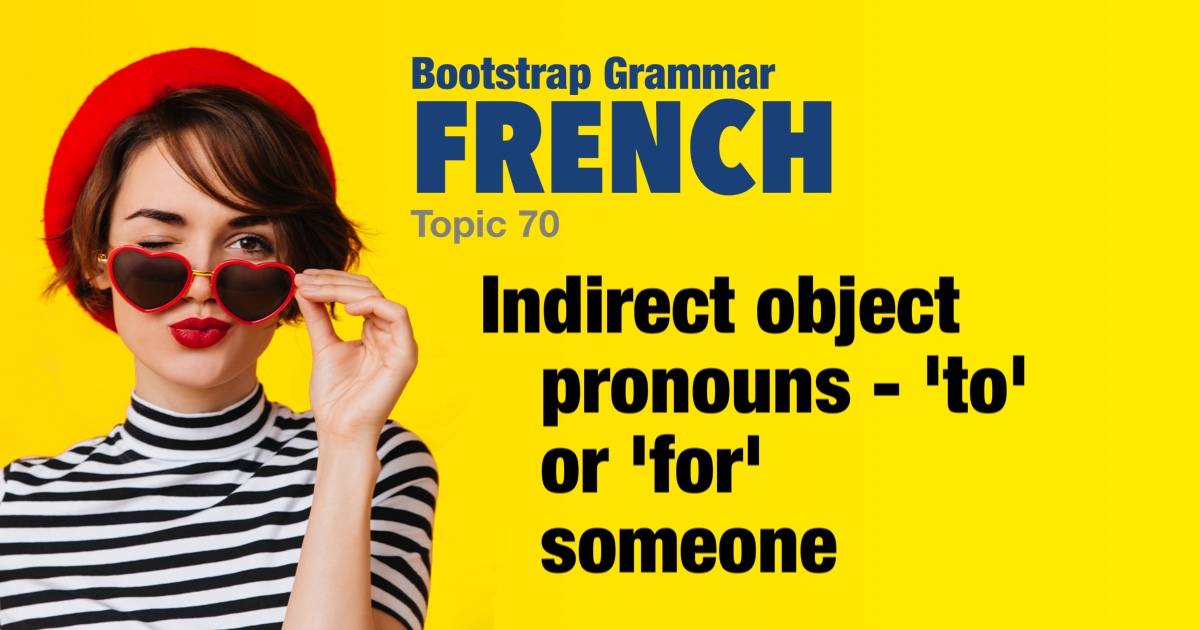French grammar - Indirect object pronouns - 'to' or 'for' someone |
|||
|
|||
Many verbs imply that the action is directed 'to' someone or is being done 'for' someone. Such verbs can include the preposition à or pour after the verb. -- We previously saw the example of parler à ('to speak to'). In place of a regular noun, such verbs can take an indirect object pronoun. The indirect object pronouns are: • je ⇒ me : 'to me' or 'for me' • tu ⇒ te : 'to you' or 'for you' (familiar) • il, elle, on ⇒ lui : 'to him/her' or 'for him/her' • nous ⇒ nous : 'to us' or 'for us' • vous ⇒ vous : 'to you' or 'for you' (formal & plural) • ils & elle ⇒ leur : 'to them' or 'for them' If we use one of these Indirect object pronouns with a verb that includes a preposition, the preposition is dropped because the pronoun itself already includes the (dative) sense of 'to' or 'for'. Note that Indirect object pronouns can only refer to a person or other animate nouns. |
| Examples: | |
|
L'homme vous donne le pain. Et je vous donne le lait.
I a giving (formal) the bread to you. And I am giving you some milk.
|
|
|
Tu parles à Louis. Et je lui parle aussi.
You (familiar) speak to Louis. And I speak to him too.
|
|
|
Vous achetez des livres pour Jacques et Jean. Leur père leur achète aussi des livres.
You (formal) buy books for Jacques and Jean. Their father buys them books too.
|
|
|
Tu donnes un crayon à Philippe. Je lui donne aussi un stylo.
You (familiar) are giving a pencil to Philippe. I am also giving him a pen.
|
|
|
Nous vous posons une question.
We are asking you (formal) a question.
|
|
|
Vous ne nous répondez pas.
You (formal) are not answering (responding to) us.
|
|
|
Pourquoi vous ne nous répondez pas ?
Why don't you (formal) answer us?
|
|
|
Je t'achète une chemise.
I am buying you (familiar) a shirt.
|
|
|
Il lui donne des fleurs chaque semaine.
He is giving him∆her flowers every week.
|
|
|
Peux-tu me prêter un peu d'argent ?
Can you (familiar) lend me a little money?
|
|
|
Pourquoi tu ne peux pas lui prêter cent euros ?
Why can't you (familiar) lend him∆her a hundred euros?
|
|
|
L'école leur annonce sa fermeture.
The school announces to them its closure.
|
|
|
Je lui téléphone dès que j'ai des nouvelles.
I call him∆her as soon as I have news.
|
|
|
Jean_Paul parle à sa mère. Marie veut aussi lui parler.
Jean-Paul talks to his mother. Marie also wants to talk to her.
|
|
|
Pouvez-vous nous faire le ménage ?
Can you (formal) clean for us?
|
|
|
Tu lui fais un gâteau ?
Are you (familiar) baking him∆her a cake?
|
|
|
Est-ce que je peux te demander conseil ?
Can I ask you (familiar) for advice?
|
|
|
Mon père brosse les dents de ma sœur.
My father brushes my sister's teeth.
|
|
|
Brosse-t-elle les cheveux de Brigitte ?
Does she brush Brigitte's hair?
|
|
|
Pourquoi ne lave-t-il pas les mains de son fils ?
Why is he not washing his son's hands?
|
|
|
Où sont les enfants ? Les parents les appellent.
Where are the children? The parents call them.
|
|
|
Le dîner de Jean_Luc est prêt. Pouvez-vous, s'il vous plaît, l'appeler ?
Jean-Luc's dinner is ready. Can you (formal) please call him?
|
|
 |
|


 The verb is
The verb is 
